-
 Bitcoin
Bitcoin $107,443.3008
-1.17% -
 Ethereum
Ethereum $2,494.2503
-0.63% -
 Tether USDt
Tether USDt $1.0003
0.00% -
 XRP
XRP $2.2496
2.23% -
 BNB
BNB $658.7569
0.63% -
 Solana
Solana $154.9826
1.94% -
 USDC
USDC $1.0000
0.01% -
 TRON
TRON $0.2799
1.07% -
 Dogecoin
Dogecoin $0.1659
-1.78% -
 Cardano
Cardano $0.5745
0.25% -
 Hyperliquid
Hyperliquid $39.7005
0.13% -
 Bitcoin Cash
Bitcoin Cash $519.5989
3.78% -
 Sui
Sui $2.7874
-2.40% -
 Chainlink
Chainlink $13.3762
-1.69% -
 UNUS SED LEO
UNUS SED LEO $9.0784
-0.64% -
 Avalanche
Avalanche $17.9846
-2.81% -
 Stellar
Stellar $0.2390
-0.06% -
 Toncoin
Toncoin $2.9028
0.25% -
 Shiba Inu
Shiba Inu $0.0...01147
-2.17% -
 Litecoin
Litecoin $86.6956
-1.27% -
 Hedera
Hedera $0.1508
-0.50% -
 Monero
Monero $322.6222
3.26% -
 Polkadot
Polkadot $3.4124
-2.99% -
 Dai
Dai $0.9999
0.00% -
 Bitget Token
Bitget Token $4.5434
-1.97% -
 Ethena USDe
Ethena USDe $1.0002
0.00% -
 Uniswap
Uniswap $7.1562
-2.61% -
 Aave
Aave $275.8830
-1.02% -
 Pepe
Pepe $0.0...09790
-4.04% -
 Pi
Pi $0.5018
-5.09%
What happens to my investment if a Bitcoin ETF issuer goes bankrupt?
If a Bitcoin ETF issuer goes bankrupt, investor assets are generally protected if the fund holds Bitcoin in segregated accounts or trusts, but synthetic ETFs carry higher counterparty risk.
Jul 01, 2025 at 01:07 am
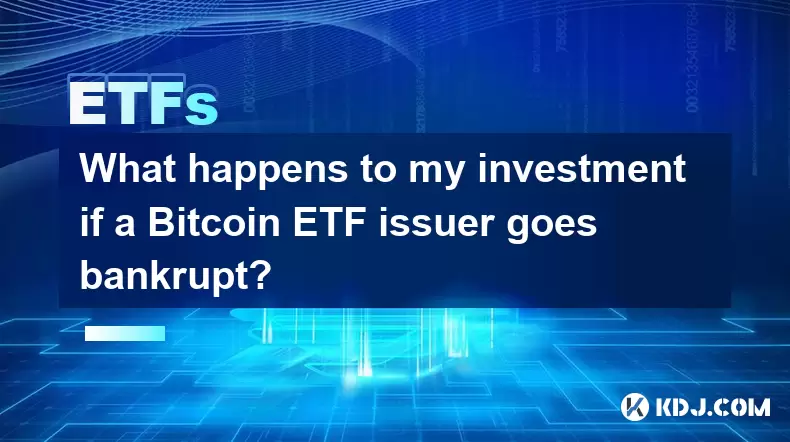
Understanding Bitcoin ETFs and Their Risks
A Bitcoin Exchange-Traded Fund (ETF) is a financial product designed to track the price of Bitcoin without requiring investors to directly own the cryptocurrency. These funds are typically issued by financial institutions, which hold Bitcoin or derivative contracts on behalf of investors. The shares of these ETFs trade on traditional stock exchanges, offering a convenient way for retail and institutional investors to gain exposure to Bitcoin.
However, one major concern that often arises among investors is what happens if the issuer of the Bitcoin ETF goes bankrupt. This scenario introduces counterparty risk — the possibility that the institution backing the ETF may fail financially, potentially impacting investor assets.
Counterparty risk is a real but manageable aspect of investing in ETFs, including those tied to cryptocurrencies.
Structure of Bitcoin ETFs and Investor Asset Protection
Most Bitcoin ETFs are structured as exchange-traded products (ETPs) or trusts rather than traditional mutual funds. In some cases, the fund holds actual Bitcoin in cold storage or uses futures contracts to mirror the price of the underlying asset. The structure of the ETF plays a crucial role in determining how your investment is affected if the issuer becomes insolvent.
In well-structured ETFs, the assets held (such as Bitcoin or cash reserves) are kept separate from the issuer's balance sheet. This separation is achieved through legal structures like trust arrangements or segregated accounts, ensuring that even if the issuer goes bankrupt, the underlying assets remain protected and accessible to investors.
- Trust-based ETFs typically store Bitcoin with third-party custodians.
- Physically-backed ETFs maintain reserves equivalent to the number of shares outstanding.
- Synthetic ETFs use derivatives and are more exposed to counterparty risk.
Legal Protections Available to Investors
Investors in Bitcoin ETFs benefit from certain legal protections depending on the jurisdiction where the ETF is listed. For example, in the United States, ETFs are regulated by the Securities and Exchange Commission (SEC), and their structures are required to provide transparency and segregation of assets.
If an issuer goes bankrupt, the ETF’s sponsor or trustee usually steps in to manage the transition or liquidation process. In many cases, the ETF will continue trading until it can be transferred to a new issuer or fully liquidated. Investors should look into the prospectus of the ETF to understand its contingency plans in case of issuer insolvency.
The ETF’s prospectus contains detailed information about bankruptcy scenarios and investor safeguards.
Steps You Can Take to Protect Your Investment
While the structure and regulation of the ETF play a significant role in protecting your investment, there are proactive measures you can take:
- Research the ETF’s structure to determine whether it holds physical Bitcoin or uses synthetic instruments.
- Review the issuer’s financial health before investing, especially its credit rating and history.
- Monitor regulatory developments related to Bitcoin ETFs in your region.
- Diversify across multiple ETFs or investment vehicles to reduce reliance on a single issuer.
Taking these precautions can help mitigate potential losses and ensure your investment remains secure even if one issuer fails.
Real-World Examples and Historical Precedents
There have been instances in traditional finance where ETF issuers faced financial difficulties. One notable example is the collapse of Lehman Brothers in 2008, which had issued several exchange-traded notes (ETNs). While ETNs are different from ETFs, this event highlighted the importance of understanding counterparty risk.
In the context of Bitcoin ETFs, no major issuer has gone bankrupt yet due to the relatively recent approval and launch of such products in key markets like the U.S. However, observing how other commodity and equity ETFs were handled during issuer failures provides valuable insights into potential outcomes.
Historical precedent shows that investor assets are generally protected when proper legal structures are in place.
Frequently Asked Questions
Can I lose all my money if a Bitcoin ETF issuer goes bankrupt?
It depends on the structure of the ETF. If the issuer maintains segregated assets and the fund is trust-based, your investment should remain intact. However, in synthetic ETFs that rely heavily on derivatives, there may be a higher risk of loss if the counterparty fails.
Are Bitcoin ETFs insured like bank deposits?
No, Bitcoin ETFs are not insured by deposit insurance schemes like FDIC. However, the assets within the ETF may be protected under securities laws and trust agreements, depending on the jurisdiction and structure.
How do I find out if my Bitcoin ETF is physically backed?
You can check the ETF’s official website or read the prospectus. Most ETF providers publish daily reports showing holdings, including the amount of Bitcoin held per share.
What happens if a Bitcoin ETF is delisted?
If an ETF is delisted due to issuer bankruptcy, it typically enters a wind-down process where assets are liquidated and distributed to shareholders. Investors may receive cash or equivalent assets based on their holdings at the time of liquidation.
Disclaimer:info@kdj.com
The information provided is not trading advice. kdj.com does not assume any responsibility for any investments made based on the information provided in this article. Cryptocurrencies are highly volatile and it is highly recommended that you invest with caution after thorough research!
If you believe that the content used on this website infringes your copyright, please contact us immediately (info@kdj.com) and we will delete it promptly.
- Donald Trump, TRUMP Memecoin, and the Latest Move: A New York Perspective
- 2025-07-01 17:10:12
- Cardano, Solana, XRP: Navigating the Crypto Seas in Q3 2025
- 2025-07-01 16:30:12
- Bitcoin Holders and the Price Hold: What's the Deal?
- 2025-07-01 16:50:26
- ChatGPT, Crypto Trading, and a $100K Profit: AI's Edge in the Wild West
- 2025-07-01 16:30:12
- Mutuum Finance Presale vs. Dogecoin: A New Challenger Approaches?
- 2025-07-01 16:50:26
- Memecoins to Buy in July 2025: Riding the Hype Wave
- 2025-07-01 17:10:12
Related knowledge
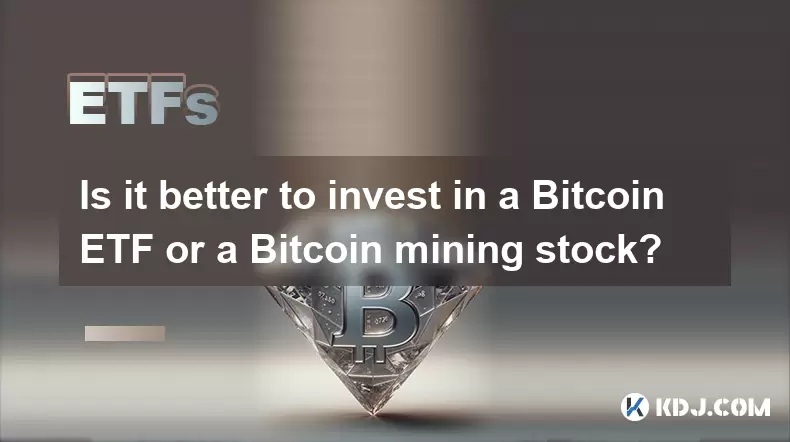
Is it better to invest in a Bitcoin ETF or a Bitcoin mining stock?
Jul 01,2025 at 03:21am
Understanding Bitcoin ETFsA Bitcoin Exchange-Traded Fund (ETF) is a financial product that tracks the price of Bitcoin without requiring investors to directly own the cryptocurrency. These funds are traded on traditional stock exchanges, making them accessible to a broad range of investors who may not be familiar with digital asset wallets or blockchain...

What happens to my investment if a Bitcoin ETF issuer goes bankrupt?
Jul 01,2025 at 01:07am
Understanding Bitcoin ETFs and Their RisksA Bitcoin Exchange-Traded Fund (ETF) is a financial product designed to track the price of Bitcoin without requiring investors to directly own the cryptocurrency. These funds are typically issued by financial institutions, which hold Bitcoin or derivative contracts on behalf of investors. The shares of these ETF...
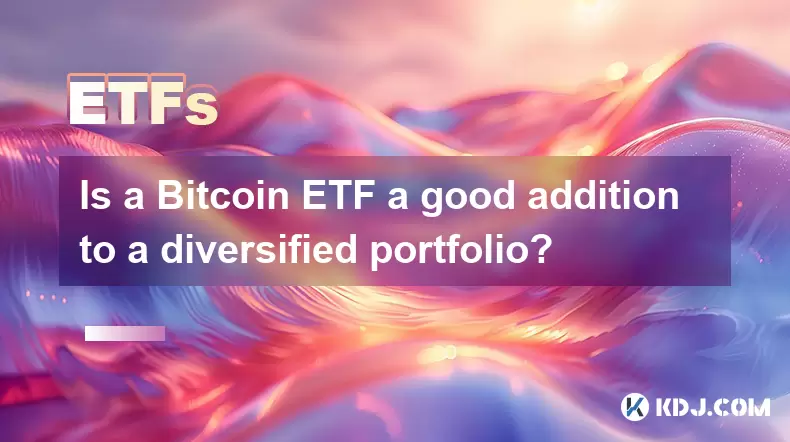
Is a Bitcoin ETF a good addition to a diversified portfolio?
Jul 01,2025 at 06:35am
Understanding What a Bitcoin ETF IsA Bitcoin Exchange-Traded Fund (ETF) is an investment vehicle that allows investors to gain exposure to Bitcoin without directly owning the cryptocurrency. Instead of purchasing and storing Bitcoin on a digital wallet, investors can buy shares in a Bitcoin ETF through traditional brokerage accounts. The fund typically ...
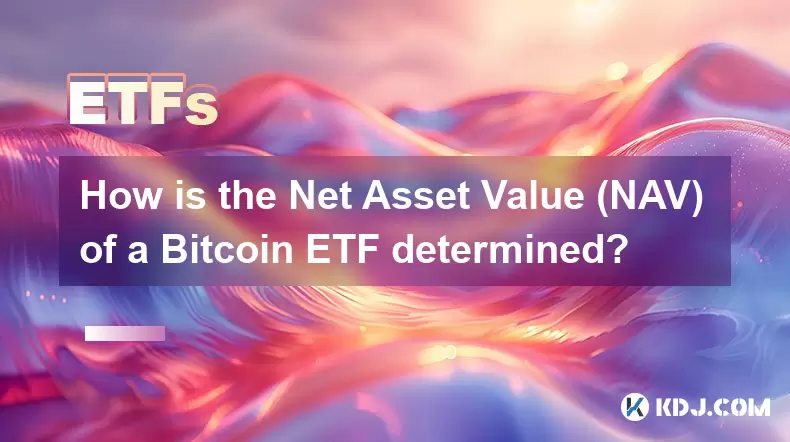
How is the Net Asset Value (NAV) of a Bitcoin ETF determined?
Jul 01,2025 at 03:43am
Understanding the Basics of Bitcoin ETFsA Bitcoin Exchange-Traded Fund (ETF) is a financial product that allows investors to gain exposure to Bitcoin without directly owning the cryptocurrency. These funds are traded on traditional stock exchanges, making them accessible to a broader range of investors. The Net Asset Value (NAV) of a Bitcoin ETF represe...
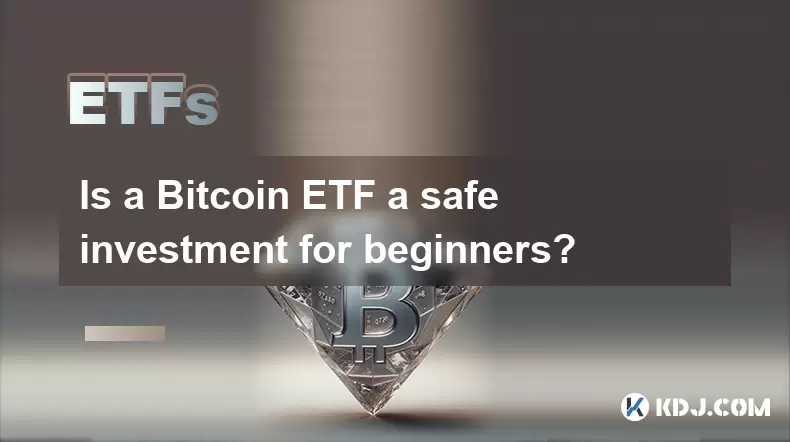
Is a Bitcoin ETF a safe investment for beginners?
Jul 01,2025 at 06:49am
Understanding What a Bitcoin ETF IsA Bitcoin Exchange-Traded Fund (ETF) is an investment vehicle that tracks the price of Bitcoin without requiring investors to directly own the cryptocurrency. Instead, investors buy shares in the ETF, which are traded on traditional stock exchanges like any other stock or fund. This structure offers exposure to Bitcoin...
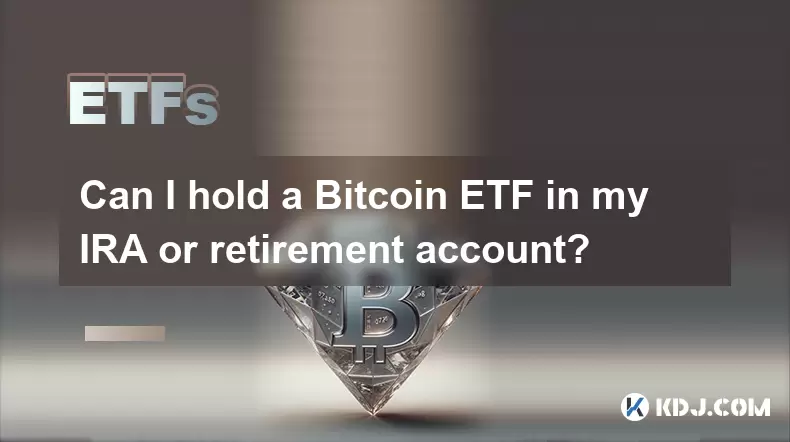
Can I hold a Bitcoin ETF in my IRA or retirement account?
Jul 01,2025 at 04:43am
Understanding Bitcoin ETFs and Their Relevance to Retirement AccountsA Bitcoin Exchange-Traded Fund (ETF) is an investment vehicle that tracks the price of Bitcoin without requiring investors to directly own or manage digital assets. These funds are traded on traditional stock exchanges, making them accessible through brokerage accounts. The primary app...

Is it better to invest in a Bitcoin ETF or a Bitcoin mining stock?
Jul 01,2025 at 03:21am
Understanding Bitcoin ETFsA Bitcoin Exchange-Traded Fund (ETF) is a financial product that tracks the price of Bitcoin without requiring investors to directly own the cryptocurrency. These funds are traded on traditional stock exchanges, making them accessible to a broad range of investors who may not be familiar with digital asset wallets or blockchain...

What happens to my investment if a Bitcoin ETF issuer goes bankrupt?
Jul 01,2025 at 01:07am
Understanding Bitcoin ETFs and Their RisksA Bitcoin Exchange-Traded Fund (ETF) is a financial product designed to track the price of Bitcoin without requiring investors to directly own the cryptocurrency. These funds are typically issued by financial institutions, which hold Bitcoin or derivative contracts on behalf of investors. The shares of these ETF...

Is a Bitcoin ETF a good addition to a diversified portfolio?
Jul 01,2025 at 06:35am
Understanding What a Bitcoin ETF IsA Bitcoin Exchange-Traded Fund (ETF) is an investment vehicle that allows investors to gain exposure to Bitcoin without directly owning the cryptocurrency. Instead of purchasing and storing Bitcoin on a digital wallet, investors can buy shares in a Bitcoin ETF through traditional brokerage accounts. The fund typically ...

How is the Net Asset Value (NAV) of a Bitcoin ETF determined?
Jul 01,2025 at 03:43am
Understanding the Basics of Bitcoin ETFsA Bitcoin Exchange-Traded Fund (ETF) is a financial product that allows investors to gain exposure to Bitcoin without directly owning the cryptocurrency. These funds are traded on traditional stock exchanges, making them accessible to a broader range of investors. The Net Asset Value (NAV) of a Bitcoin ETF represe...

Is a Bitcoin ETF a safe investment for beginners?
Jul 01,2025 at 06:49am
Understanding What a Bitcoin ETF IsA Bitcoin Exchange-Traded Fund (ETF) is an investment vehicle that tracks the price of Bitcoin without requiring investors to directly own the cryptocurrency. Instead, investors buy shares in the ETF, which are traded on traditional stock exchanges like any other stock or fund. This structure offers exposure to Bitcoin...

Can I hold a Bitcoin ETF in my IRA or retirement account?
Jul 01,2025 at 04:43am
Understanding Bitcoin ETFs and Their Relevance to Retirement AccountsA Bitcoin Exchange-Traded Fund (ETF) is an investment vehicle that tracks the price of Bitcoin without requiring investors to directly own or manage digital assets. These funds are traded on traditional stock exchanges, making them accessible through brokerage accounts. The primary app...
See all articles

























































































